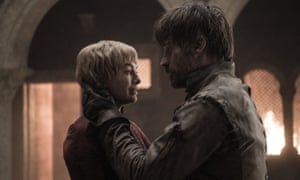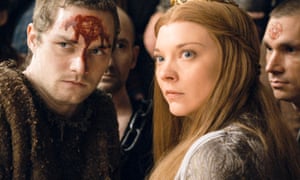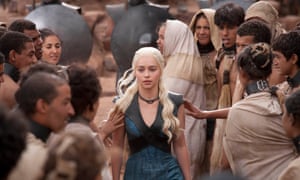Game of Thrones: how it dominated the decade – then lost its way
It was the fantasy juggernaut that everyone from Obama to Snoop Dogg loved. So why did it fall from grace so swiftly?
Sarah Hughes
Monday 30 December 2019
In the 2010s, there were TV shows and then there was Game of Thrones. HBO’s adaptation of George RR Martin’s epic fantasy series dominated the entire television landscape. Endlessly dissected online and beloved by everyone from former president Barack Obama to Snoop Dogg, it became the subject of countless fan videos and closed out the decade as the most popular show on earth, averaging more than 25 million viewers per episode (an official figure that didn’t even take into account the illegal downloads, which also saw it win the dubious accolade of the globe’s most pirated TV show).
It was also the last piece of true event television in an age where our viewing is increasingly splintered by the rise of streaming. While other shows exist to be binged in one greedy gulp, Game of Thrones had to be watched weekly – a fact that only boosted its appeal, making it the show on everyone’s lips every Monday.
Most of all, though, it changed the way the world thought about fantasy on the small screen. Prior to Game of Thrones, accepted wisdom said it was impossible to turn fantasy into a TV hit. Post-Game of Thrones, TV executives seem unable to stop commissioning variations on the theme.
Westeros DNA can be spied in everything from straightforward historical epics such as The Last Kingdom to the weird, wild world of Sky Atlantic’s Britannia. Netflix’s The Witcher is the latest show to conform to the fantasy juggernaut’s template of gruesome violence and largely gratuitous nudity.
It wasn’t always this way. When Game of Thrones began in 2011, the focus was as much on the sharp one-liners and the cunning political machinations as it was on the big twists and even bigger spectacle. But as the show progressed – and crucially, as creators David Benioff and DB Weiss were forced away from Martin’s books due to lack of new material – the show became less character driven and ever more bombastic.
Never was this clearer and more devastating than in the season six finale, The Winds of Winter. At the time of airing, the episode – in which Cersei Lannister wiped out Baelor’s Sept and with it much of the cast – was hailed as a triumph, a sure sign that Benioff and Weiss had a thrilling endgame in mind. In reality, it was the moment that fatally weakened the foundations on which the series was built – and provided proof that, when in doubt, the writers would always blow things up first and ask questions later.
Having established Cersei as a master villain, Benioff and Weiss appeared to have no idea what to do with her, largely deserting the intrigue in King’s Landing to concentrate on the epic fights. That was understandable given the importance of a final showdown between the Night King’s undead army and the rest of humanity, but the gaping hole where politics used to be ensured that the last two seasons prized showy did-you-see-that? moments – the sudden death of Littlefinger, Daenerys’s fiery destruction of King’s Landing – over carefully nurtured plots and character development.
This obsession with style over substance also had a knock-on effect on the shows that came after. Many of those big-budget projects such as Troy, The Bastard Executioner and American Gods were flops, made in the most shallow image of Game of Thrones and ignoring the fact that what originally made the show a hit were its quieter moments.
Conversely, the series that have worked – Outlander, Penny Dreadful, the BBC’s recent adaptation of Philip Pullman’s His Dark Materials – did so because, like Game of Thrones, they put the story they were telling above flashy special effects. Each also exuded the feeling that this was fantasy adapted by people who adored the source material, not just executives scrabbling around for a hit.
Not that the high-profile failures have stopped the commissions coming. Huge adaptations of Lord of the Rings, Robert Jordan’s classic fantasy The Wheel of Time and Patrick Rothfuss’s cult series The Kingkiller Chronicle are in the works.
Some may prove to be worth the wait, although it’s hard not to wonder if TV will already have moved on by the time they arrive because perhaps the most interesting thing about Game of Thrones is the way that – despite all its noise and thunder – it faded so swiftly from the collective memory, slipping down the best-of-the-decade lists and increasingly attacked for being not so much the story of Shakespearian grandeur it promised to be but instead, in Macbeth’s words, a tale “full of sound and fury signifying nothing”.
At its best, though, Game of Thrones was addictive and unmissable TV, filled with great lines and genuinely surprising and well-earned moments. But history can be cruel to shows once lauded as the best of their era.
It is also true that its limitations were built in. Race was badly handled from the beginning, with the Dothraki presented as violent savages and Daenerys’s storyline constantly flirting with white saviour tropes. It also consistently courted controversy over its handling of sex, from the decision to shoot Sansa’s brutal wedding to Ramsay entirely through Theon’s gaze to the mishandling of a scene between incestuous siblings Jaime and Cersei that turned it from reunion to rape.
Such issues – coupled with the sense that this was ultimately a show comprised more of bombast than brilliance – means that Game of Thrones’ greatest legacy may turn out not to be the myriad copycat shows it spawned but rather the silly sums of money the makers of those shows willingly spent. Game of Thrones is dead; long live Game of Thrones.









No comments:
Post a Comment